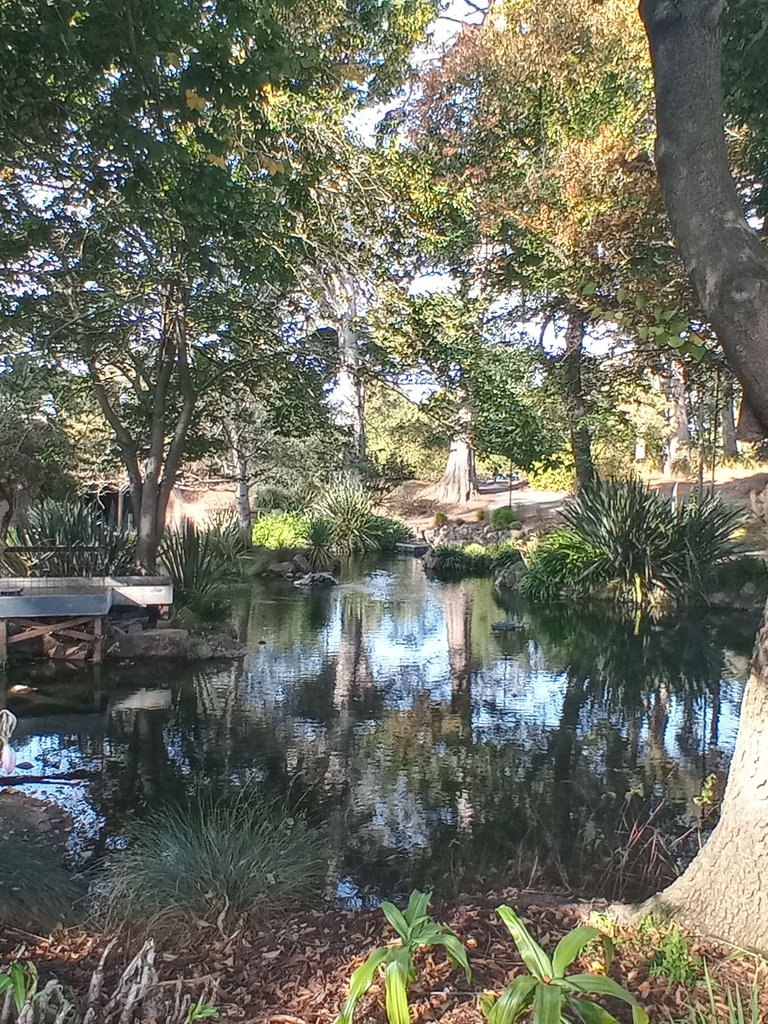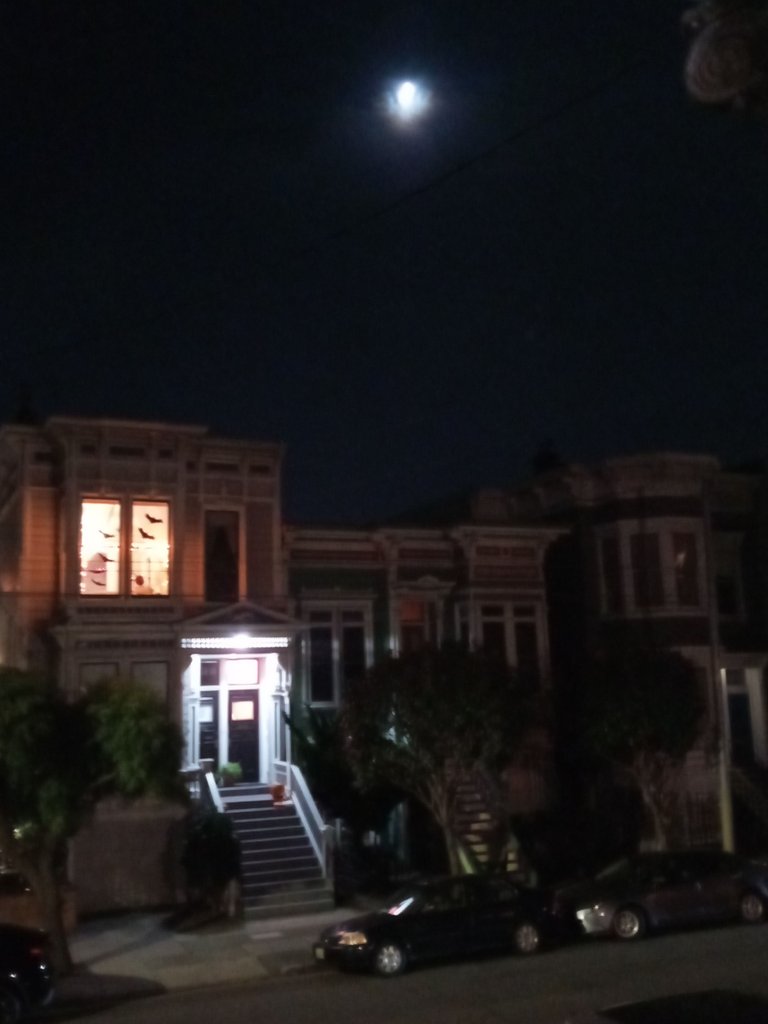
The above picture has it all ... bats flying up in the window of my neighbor, an apparition in the upper-right hand corner flying a ghostly line of darkness barely visible in the light of the moon, itself veiled in ghostly gray ... a good night for a nightmare.
I shuddered at the thought of where I had been ... had I stayed, and not climbed out -- for 27 years, to say nothing of 29 months -- it was an even more terrifying thought than it had been before the election. It was nightmare worthy ... but for a different day ...
This week, of course, was the time for that nightmare.
No matter how one's conscious mind can be moved to walk in line with faith, hope, and love, the unconscious mind has its own things to deal with, and I know with the crew that has been elected, the second of Brahms' Four Serious Songs is going to come into play even more.
"Ich wandte mich" has a passage from Ecclesiastes as a text that is a nightmare ... a king, Solomon, in fact, turns and looks upon all mankind, and even with his wisdom and his riches, he cannot change the fact that the oppression of mankind is vast, and so many will suffer and weep without any comfort, as if abandoned by God and man, so much so that it seems that those who are already dead are more blessed than the living, and more blessed than both are those who never come to birth, for they never have to see or experience the evil done under the sun, evil so severe that even a king's heart cannot withhold its grief at the realization of his relative powerlessness. He can look back from a position of privilege, and he can keep those with him relatively safe, but when he turns to look ...
Ukrainian bass Alexander Kipnis made a magnificent recording of Brahms's Four Serious Songs, and the gravity of his singing shines in "Ich wandte mich" as in no other song -- the anguish comes through so well ... the grief, the frustration ... the anger ... it is all there and portrayed so well ...
(Mr. Kipnis is the only other bass thus far that stands up by my favorite musician ... but we shall hear from him later in Haydn!)
Of course, this is the large nightmare I live with, historical and personal. I know the history of what African Americans have suffered in the last 405 years, and my neighborhood had a crack house five doors down when no one in my neighborhood grows cocaine or makes guns ... and no one protected the majority of the children who had to grow up in all this. My parents and grandmother protected me and my sister, but they could not reach everyone ... the city didn't care, the police didn't care ... we were supposed to be gentrified out, and the crime was part of the reason why ... and it worked. Only three people of my generation survived on my block ... and for this aspect of mourning, one needs piano music of my own heritage ... Samuel Coleridge-Taylor's transcription of the Spiritual "I'm Troubled in Mind" also has that deep aspect of extreme beauty making it possible to witness extreme, mind-bending levels of pain, and the pianist, Mr. Richard Alston, made this gorgeous recording in response to the troubles of the world ...
I dealt with the survivor's guilt for years, but I also started as a community servant at 16. I was not going to just turn and look -- I was going to make sure the next generation had that help. If I was spared, I was spared for that -- and that is how I survived and still survive that nightmare. Ain't gonna let nobody turn me 'round.
But there is another, more personal nightmare, and the election augmented it ... upon such a midnight dreary there was no longer any fighting this off ... I turned and I looked upon all those I had left behind, in their anguish at the realization that the coming years will be so much harder than any of us expected, and said unto them, "But if you are poorer and more miserable on January 20, 2025 than you were on January 19, there is no need for you to blame Donald Trump, and it will not be accepted as an excuse, for you knew me, and I loved you, and I did my best so you could benefit as I have in these three years to prepare for the next four ... but you would not ... you would not!"
Then the hands reached out to me ... some in desperation, some in rage ... none could reach me as I could not reach them, though it seems that the emotions of all were enough to rip my heart from my chest ... but the ripping was never quite done ... as if Cassandra, the far-seeing one, were given the punishment of Prometheus, to not only never be believed, but to have her heart eaten alive out of her chest, over and over and over again, by the sight of it.
But of course, one could turn away from seeing it and walk on -- and of course, I had -- and so I woke up, in well-protected peace, long past having those conversations.
And there began the real nightmare, from which there was no escape -- to be alone, when all I could have desired was to have more whom I cared about share in more of the readiness and peace I enjoyed, especially in light of the election.* It was not enough to realize, even with one's achievements, that they paled in comparison of the work needed to ease the suffering of humanity -- "Ich wandte mich" would have been enough to deal with.
But to realize it had to be enough to secure one's self, because it was not within one's reach to move the hearts of even those once near you to get on the climb -- to have been so graced to be able to make such moves, and to know there was nothing that could be done where grace had been refused, and to know what the outcome would have to be in such cases ... perhaps this is how one gets to such thoughts expressed in "Ich wandte mich" ... it seems that anything would be better than to have to see that outcome ... again ... to always be troubled in mind, as witness. If I walked in pride, I might have had the brief comfort of congratulating myself on my escape when others apparently less whatever had failed ... but all I felt was heartsick grief ... and this night it sat upon me again.
But also this came to me: the luxury of lament was the other side of the luxury to have resources and room to do something about what you could. One was how you felt, and the other was what you did. One was not meant to be calloused, to shrug one's shoulders -- to be human is to have the right to even these feelings in the face of loss, to not have to pretend that I was not deeply hurt, and that I would not have to continue the journey of healing as I was going to where pain was no more. This was part of my life, and my walk ... and if nights like this were a part of that, so be it. Samuel Coleridge Taylor, as composer, had done what our ancestors before us had done and made beauty of such moments in the end. So would I.
But also, such moonlit nights were also bass midnights ... so then a portion of the conversation from last week echoed ...
No one may prevent the storm, and winter itself, from coming, but if one hears the call of wisdom and love, one may find refuge from whence it comes, and be safe there ... and if not alone, then safe among others who accept the responsibility of being stewards of that safety.
That was the key ... to keep walking and abiding and adorning one's self in the light, and finding and walking with fellow stewards ... nights too, would come, but also, dawn ... for it was also written:
Weeping may endure for a night, but joy comes in the morning.
The world would continue to turn ... evening and morning, as it was written at the beginning ... and I could, having found refuge in walking as I was called, have both, and keep going.
With that thought I closed my eyes again for a just a little while ...
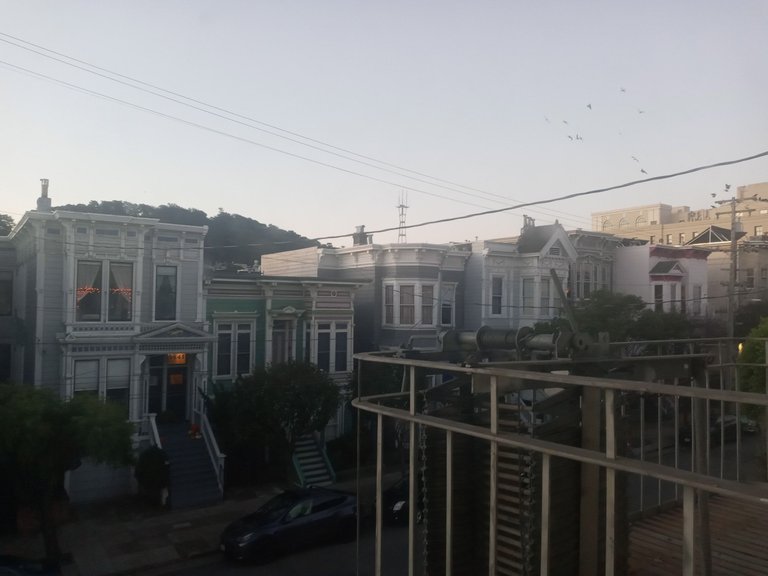
Day drew near, and then dawn looked in upon me; I had an early conference call that was a marvel, as if the anguish of my heart had been heard, and my fellow stewards for needed community work had been summoned with me ... so with that and the foregoing nightmare both in mind, I decided to take an early walk to consider all matters at hand. From midnight to bright morning ... quite a change!
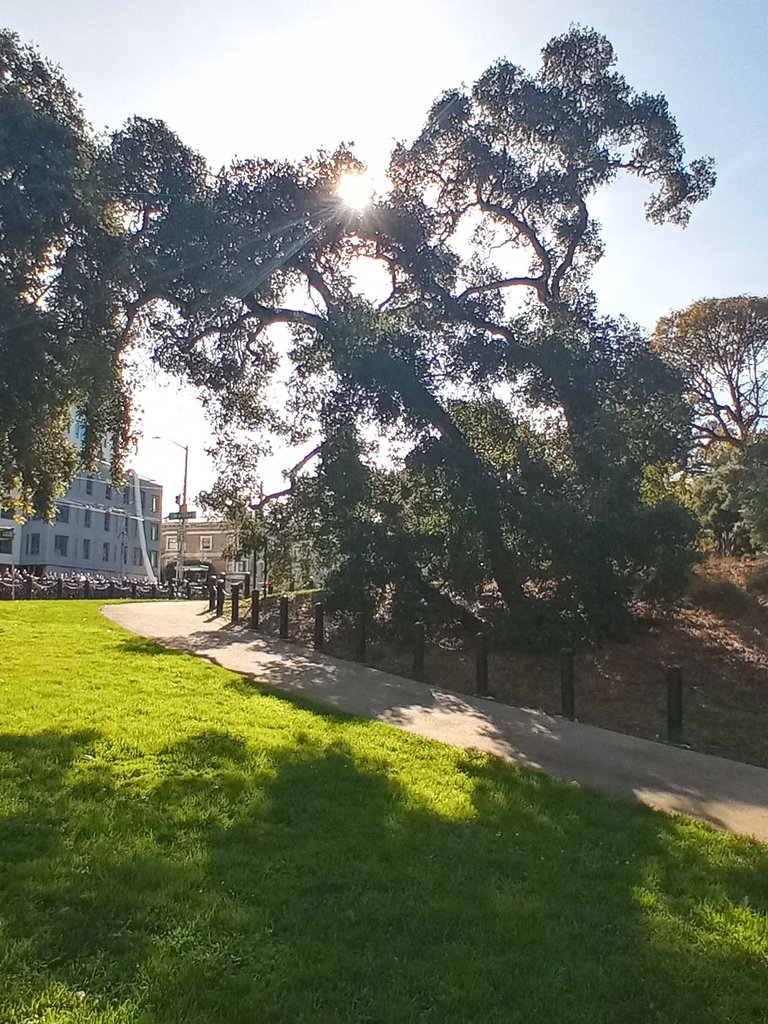
The shade was still quite deep on the route I chose ...
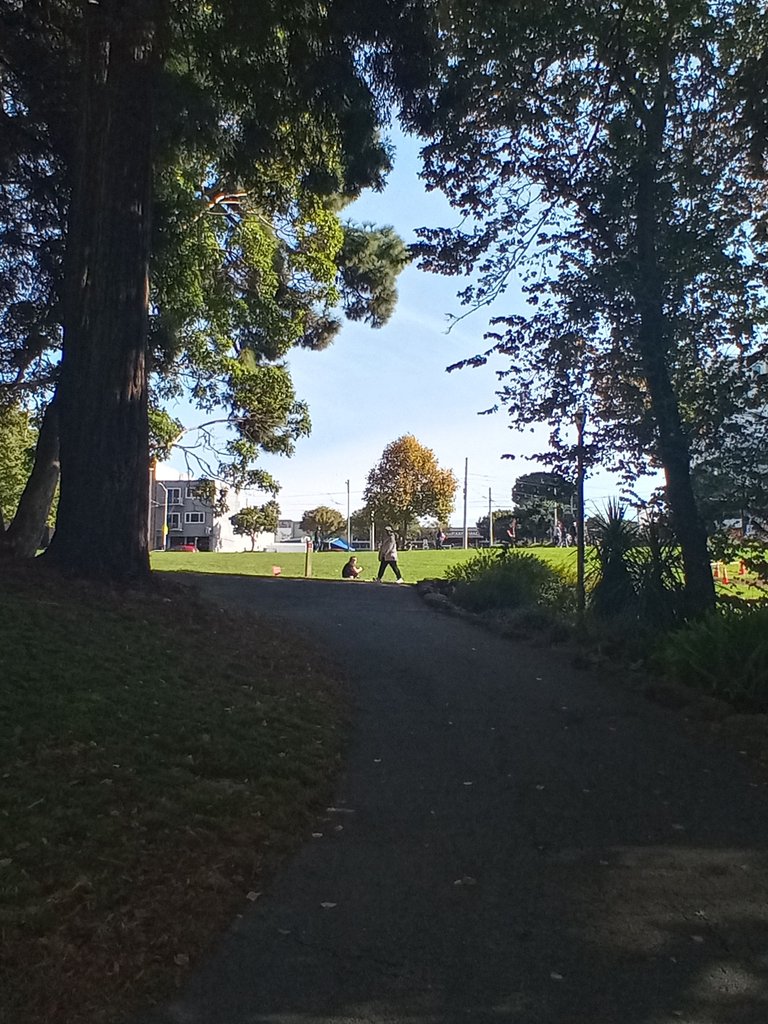
... but at every turn the light was rising ...
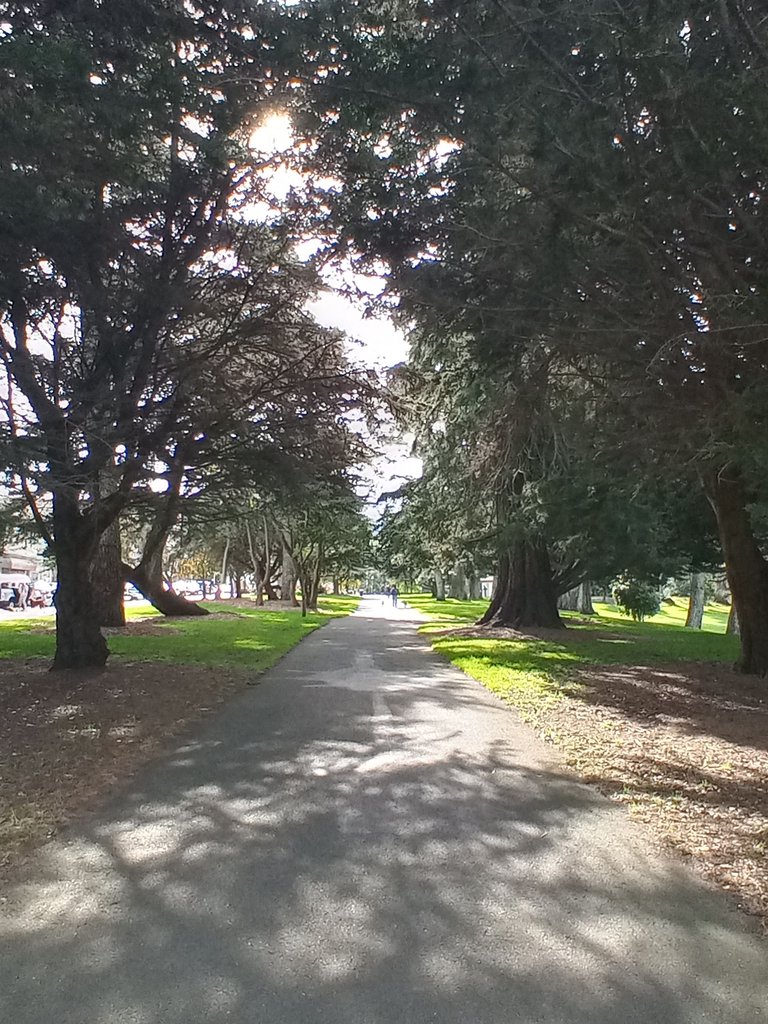
... and glimpses of almost shocking golden splendor were more and more appearing ...
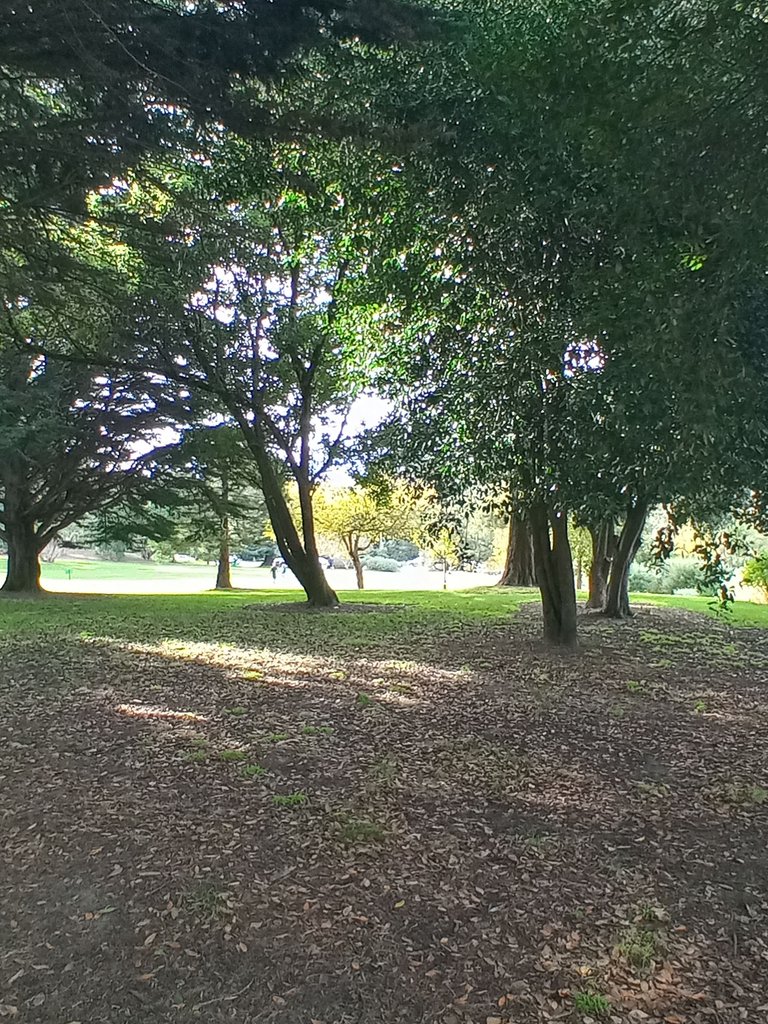
... and then I began to remember Beethoven's most underrated piece of choral music: "Da steigen die Menschen an's Licht," in which the world turns, and mankind at last emerges from a night of oppressive darkness into the light, into the warmth of the sun and also divine grace!
(And, I have discovered another soprano I like and will watch for: Bodil Arnesen!)
While in thought of this, with the reds of dawn gone from the sky but awaiting me around corners ...
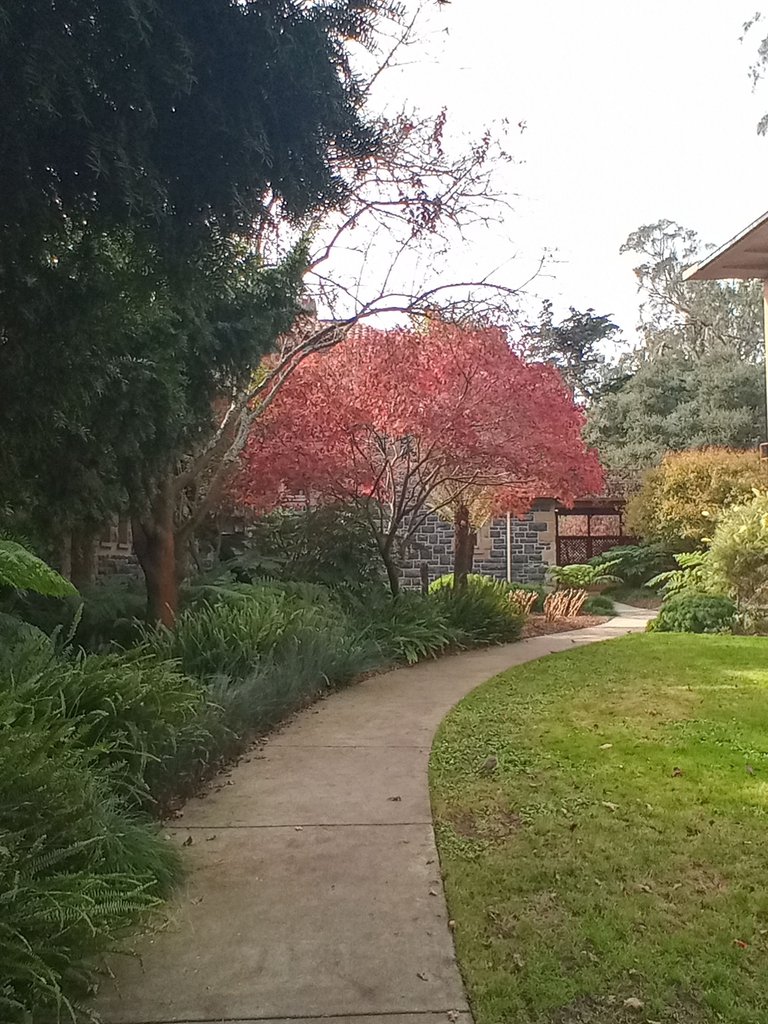
... and flashing along my path into flame ...
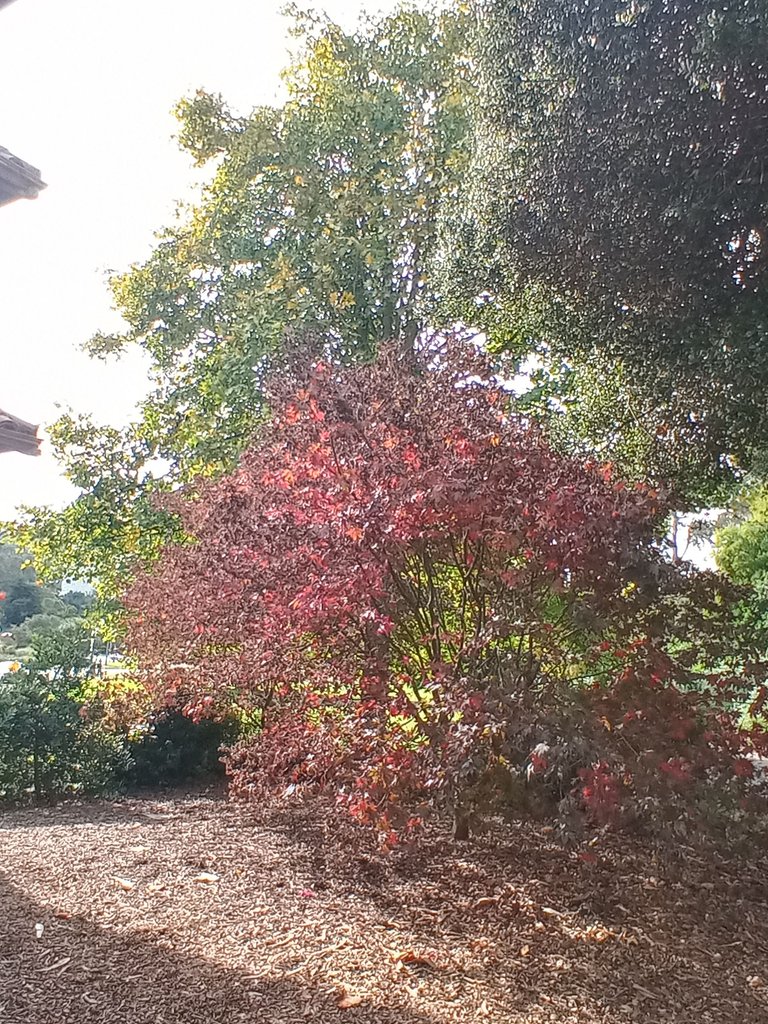
... I knew I began to hear notes Beethoven at 19 years of age might have indeed thought about putting into the double bass but did not ... because not only was he writing in memory of the Emperor Joseph II, but also dealing with the grief of the loss of his own beloved mother ... but perhaps I was hallucinating a bit ... the burden of the night was lifting from me and I began to feel gloriously light and near the edge of ecstasy that autumn's beauty and mild climate here tends to put me in as the beauty of the morning just kept increasing ...
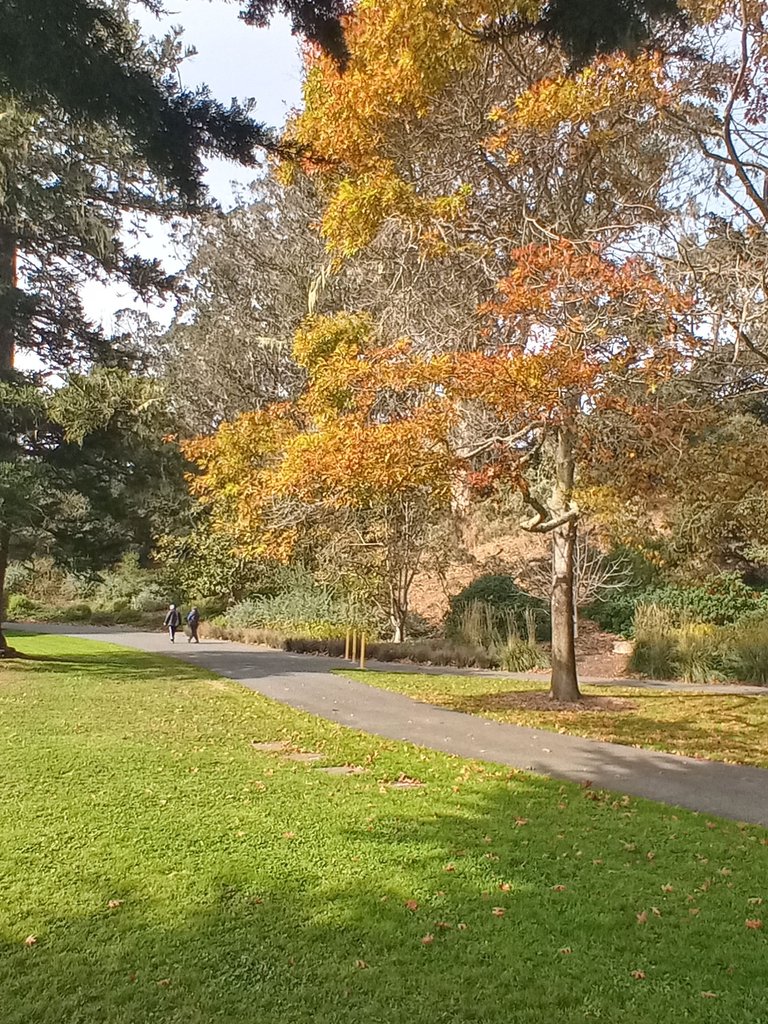
But no: I was not hallucinating ... just the wrong composer's inspiration ... it was as if Johann Strauss had come along and said, "Now, that would also make for a lovely waltz with the right accents," for someone was interpolating a bass line that fit perfectly well, and that a double bass or contrabassoon could easily play, but also within in the range of a basso profundo's mortal voice ... just putting in octave-lower accents on the existing low notes on the first of every three beats ... so the world turned into the light, and danced around the warm sun in its joy ... it was subtle ... it would take another composer-arranger who knew that voice well to realize ...
"Is there an echo out here on these low notes," I said aloud, "inviting me to dance?"
The Ghost of Musical Greatness Past appeared in a hiking suit of hunter green and gold and bronze accents well befitting the colors of the day --
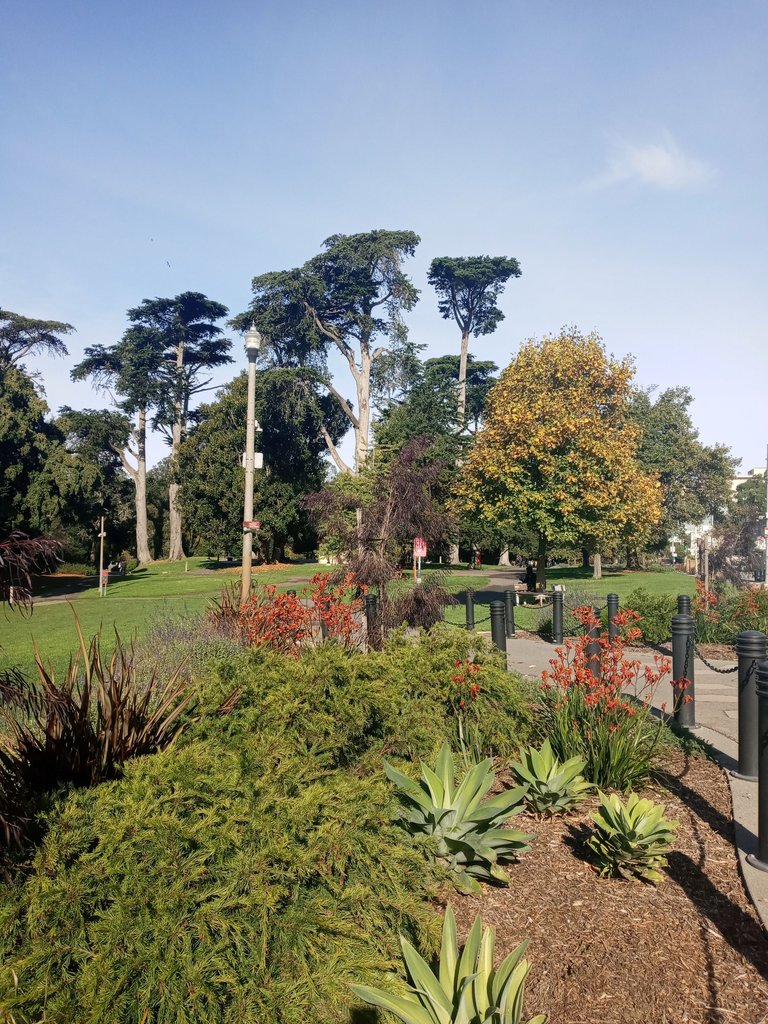
... and dazzled me with his colossal smile, bright as the morning!
"The beats don't actually divide right to make this work!" I said.
"And since when did that ever stop me, with my excursions -- live, mind you -- into 10/8 time, and you with your polyrhythms?"
"Well, you have me there -- you win -- Sie gewinnen!"
And so he swept me laughing across the meadow with the waltz he had interpolated out of Beethoven with just some well-placed deep notes --
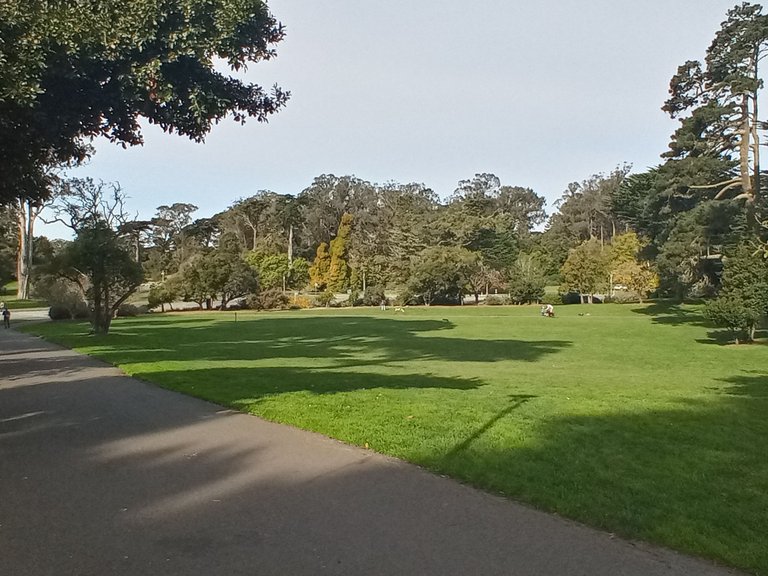
-- and up a little hill --
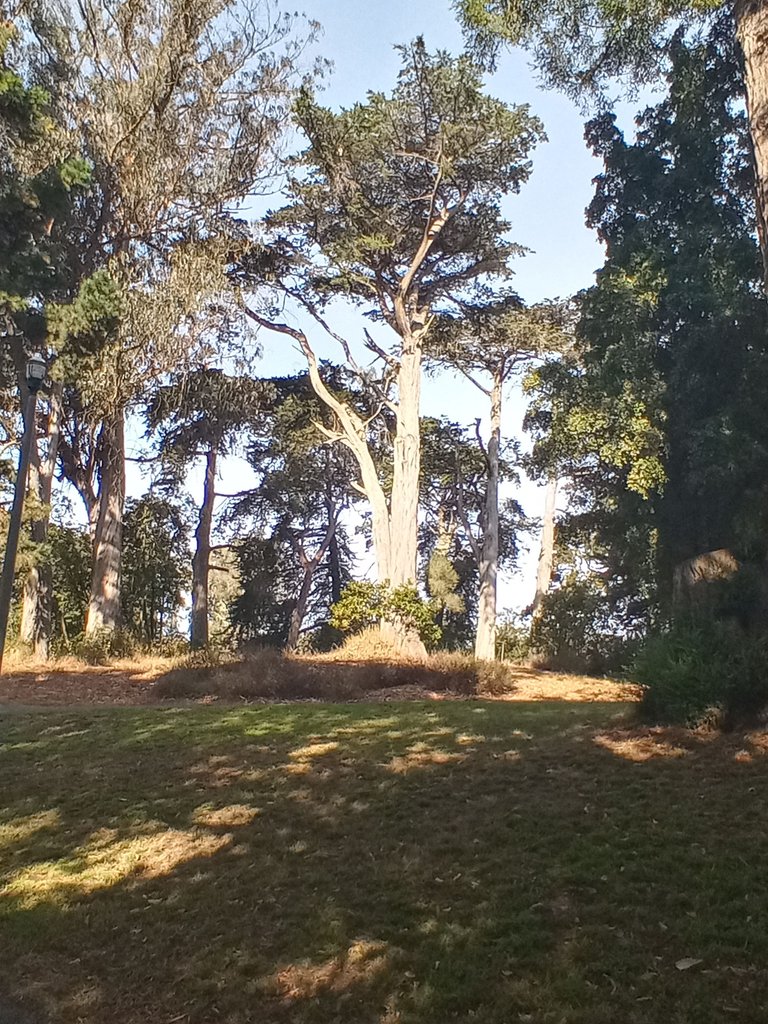
--- and down to what he had wanted me to see -- back to Alvord Lake, where spring had come again --

-- and summer --

-- while autumn burned -- in metallic accord, to put it in Schubert's terms in "Aus Heliopolis II" -- in the light of morning!
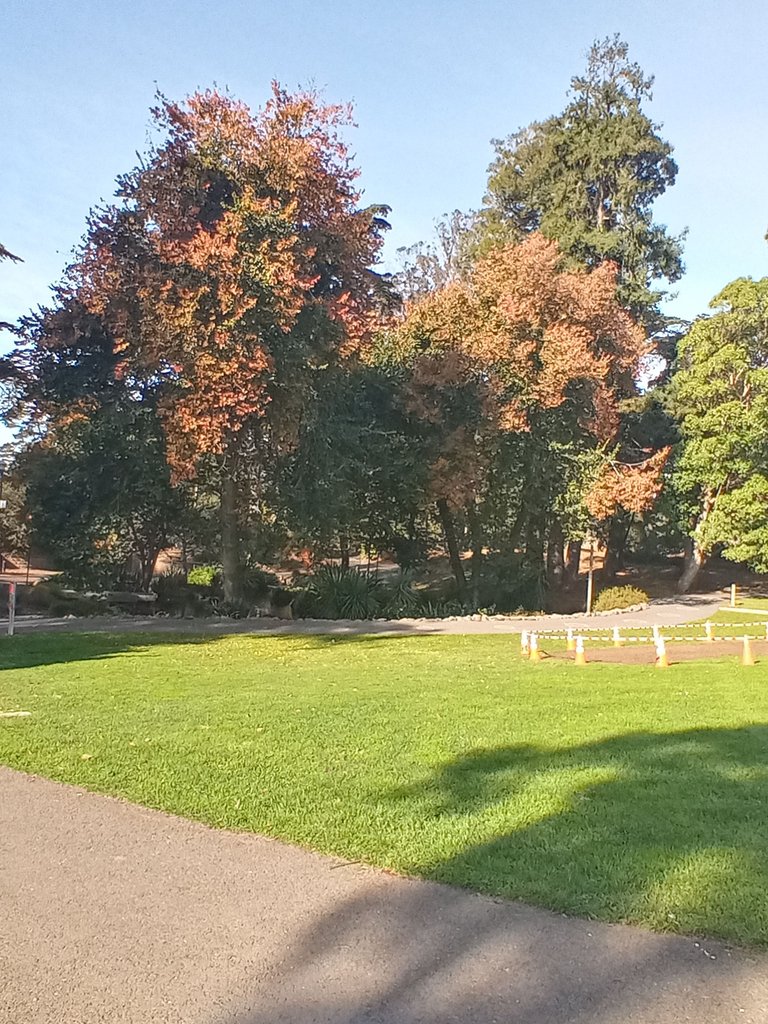
I might have thought to catch my breath at last, but no ... I had not been at Alvord Lake this early in the morning at this time of year, and it still had surprises for me in its still, deep shade on one side... pools of emerald and tourmaline ...
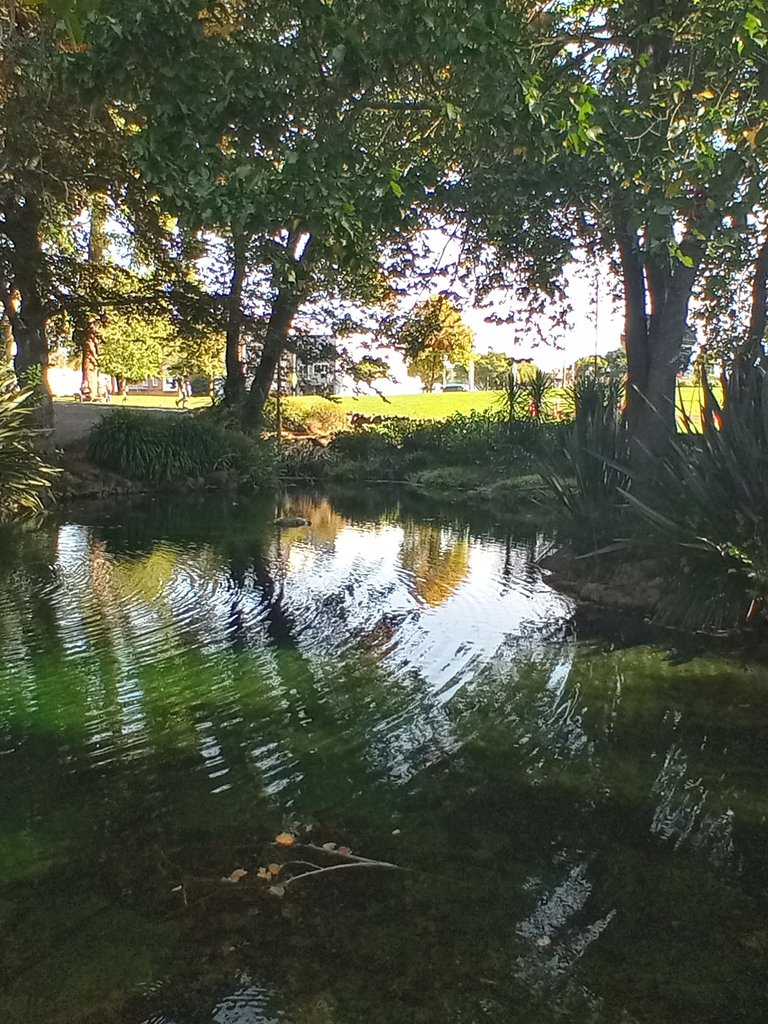
... and curtains of (crab apple) rubies ...
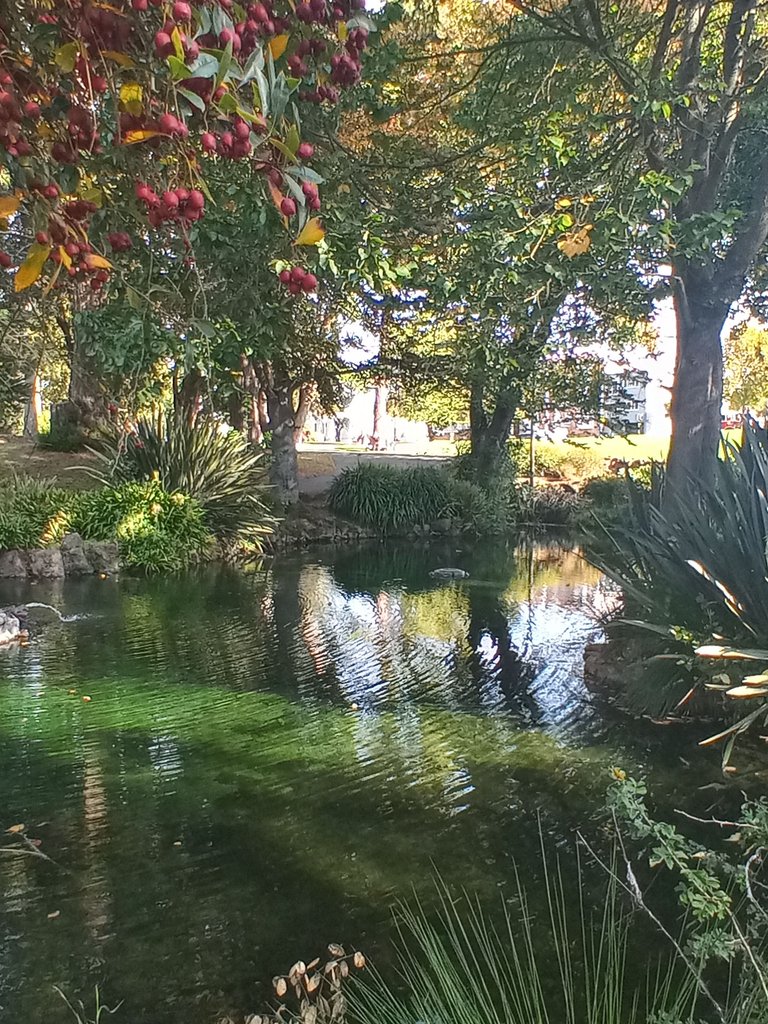
... with turquoise just beyond them...
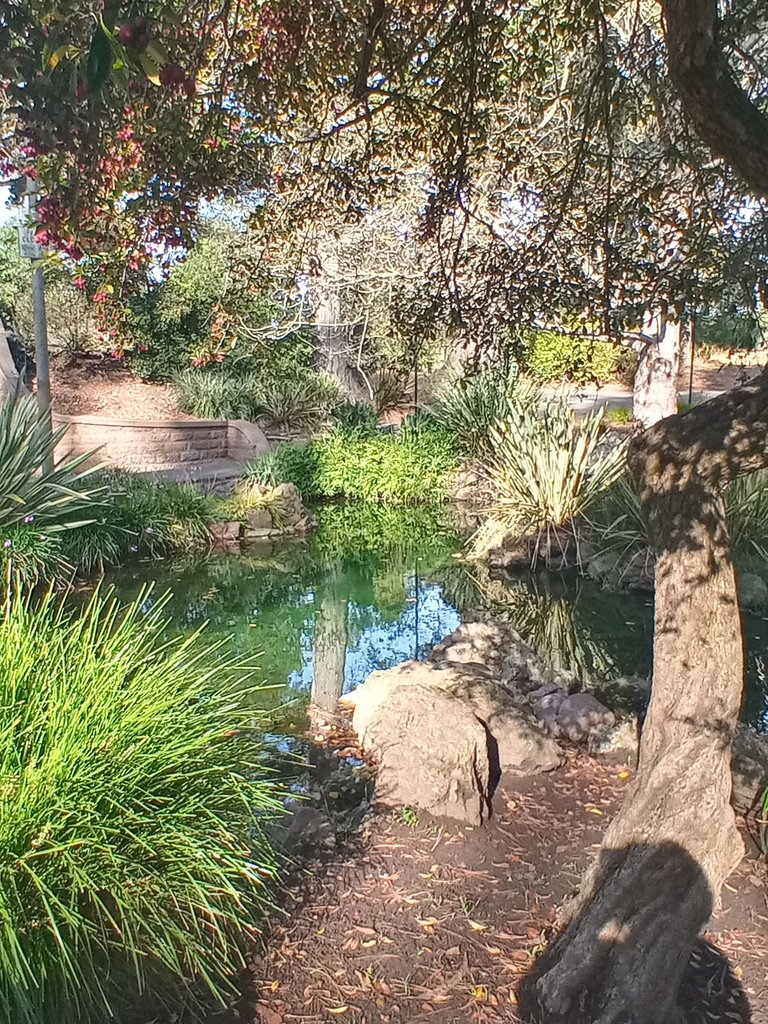
... and brought from the deepest midnight to the brightest and most beautiful of mornings, I marveled ... to come to where I was from where I had been ...
"And, Frau Mathews, thus shall it ever be at times," he said gently when I had recovered somewhat. "I merely echo what I sang of in The Creation, and one only has to read nine chapters hence -- and you had done that before being more than a wee little girl of five years old, in the same span of years that you first heard that great oratorio by Haydn. The evening and the morning, and thus the midnight and the midday, are yours ... and later, so long as the world endures, you learned that summer and winter, seedtime and harvest, are also yours ... you are human, Frau Mathews.
"Not only that: you cannot have eternal night, and I noted, with deep delight, that I did not need to warn you from the abyss of despair last night. You ignored the call completely, and this wisdom you are developing we shall build upon in a moment. But, you cannot have eternal night, for you are called from it forever. You will have eternal morning ... but on that day you shall be with me, singing from your alto seat on high and enjoying all the infra-bass harmonics from my section that the world cannot endure here ... as the least of all joys you shall experience.
"You are still on earth, Frau Mathews, and the earth and your circumstances must turn ... it is enough that you seek the light, and do not yield to the darkness, for no night for you can last forever as you live toward that eternal day that is ahead of you."
The converse of that thought came to me and sobered me even in the midst of the bright morning.
"Yes, it is also true, Frau Mathews. No day can last forever for those who 'love darkness rather than light, for their deeds are evil,' as they refuse and at last can no longer even find the light, for eternal night shall overtake them -- 'wandering stars, to whom is reserved the blackness of darkness forever.' And, no, that is not something that one should consider with any lack of gravity or mourning ... for in it, all the tragedies of mankind are rolled in brief.
"But here I commend you, and expand upon some wisdom you grasped in that dark midnight for you, Frau Mathews ... you ignored the abyss, and accepted the gravity and the mourning, and realized: it is part of the calling. This is a secret most people cannot endure, for it is part of our basic human nature to seek pleasure and avoid pain, and we imagine that if we are called to some high and holy calling we shall also have all of its joys now."
"But then life happens," I said, "and we are reminded we and others are still of the earth, still subject to the consequences of our and others' wrongdoing," I said, "and still subject to death and decay along with everything and everyone we love."
"Yes. As evening follows morning, and spring, summer, fall, and winter follow each other, all those things are ours as human beings to endure, and the lack of accepting that one thing is what drives many in the end to despair."
"But for those who have abandoned the pursuit of delusions of godhood, all these things are given to be lived, and for the reality of those things that you and I both are most deeply concerned with to be seen and enjoyed even more deeply."
He smiled ... and said no more, letting me think in the beautiful serenity of our surroundings ...
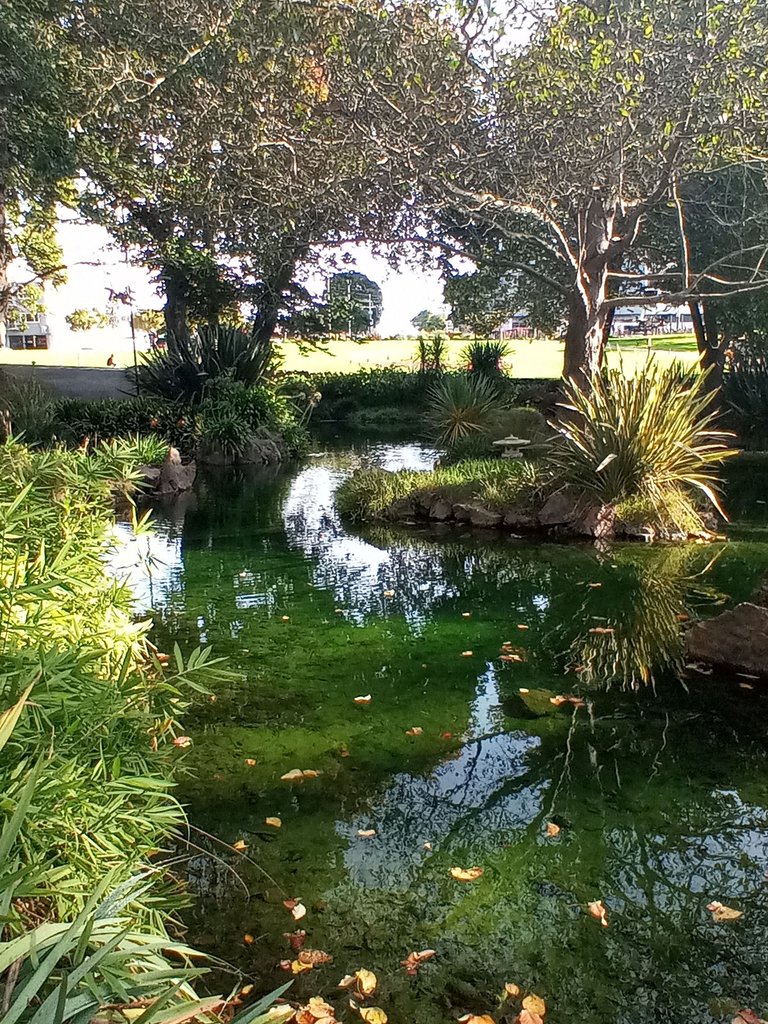
... and then went around to the point in a different way.
"We need not overlook living bass Morris Robinson, you know," he purred. "He was once mentioned as the consolation for the world having lost a much over-rated German bass who cannot be permitted by his fans to enjoy his permanent retirement."
I sat down on a rock and just laughed until I cried at his self-deprecation.
"Well, Mr. Robinson is the best King Marke in the world at present," I said, "and he has in common with you a deep way of connecting to the music he sings and a quality of voice -- not as dark, for he is a bass-baritone, but full moon midnight blue, so the nearest in that quality of extreme beauty."
"Equally lovely in a calm blue dawn as well, Frau Mathews."
"Yes."
"Now, Madame Living Composer, Mr. Robinson is your elder near-peer in age ... and he is dimly aware of you already because you were the one person on Facebook who was first to congratulate him for something of deep importance to him: his work for the next two years in education. I am mentioning him to double purpose!"
"Yes, sir," I said.
"And I also remind you that you have an autumn song to share with Eric Hollaway for his next album -- he is looking for more things that are jazz-ish, so, do not let "I Remember the Love" that you wrote in mind of your one great love fall to the ground!"
"Yes, sir," I said. "You know about Hurricane Milton and Helene, and what they did in his area ... I'm not trying to disturb him."
"It is a lesson for another day, Frau Mathews ... oh, meine Studentin, we must work on this ... so, here we have a basso profondo who cannot find things for a voice this low, looking for music, looking for a spark to kick everything he was doing back to life, looking for inspiration, and here we have a contralto profondo composer whose vocal range is almost an exact match an octave higher, writing the music he wants to sing ... but she is just sitting on that music, thinking she will be a bother! We have so much work to do, Frau Mathews ... ach, die Arbeit! Die Arbeit! Mein Gott, hilfen Sie mir!"
When an old German professor of music loses his English in dismay -- he just took a walk around the lake by himself, the speed of his exclamations and those butter-smooth consonants completely eluding me although he was never quite out of earshot. I gathered he was praying aloud from his last exclamation ... and I sat down and prayed for myself, because he was right: my confidence level as a composer did not meet the level of the music I was capable of producing, and hadn't for decades. It was a lesson for another day, perhaps in preparing for 2025 because I sensed there would be a greater need than ever. Nonetheless I was soon in tears ... even recently, the attacks I had endured had brought up the pain of those formative years.
The old master singer and teacher returned with an expression full of compassion and open arms, and in his wisdom laid the subject aside for the time being when I had composed myself.
"To return, you have told me what you hear in the voice of Mr. Robinson. Consider that of one of my models, Herr Gottlob Frick -- how would you describe his voice?"
"He was once described as the blackest bass ever," I said, "and although he is by no means inferior in vocal beauty to any of the great singers of his time, the blackety blackness of his voice is like a winter night with no stars. Now, if it is overcast, there can be lightning, and that lightning will shine out from the east to the west on that background. If at any time any light comes through it will be stunning. His singing of the tender songs of Robert Stolz is just devastatingly beautiful for that reason, and there are moments in his King Phillip that also are heart-wrenching. But if he had recorded Schubert's Winterreise, nobody would have survived -- the moon in that first song never would have made it through and that character would have tripped over a tree root and if he didn't, we mentally would have, and been gone --."
It was his turn to laugh until he cried.
"I live in your imagination, but I still am never ready!" he said before again rippling the lake with his laughter.

"To the point that I have been working toward for the last twenty minutes," he said at last after wiping his eyes with his ethereal handkerchief, "what I wish you to see, Frau Mathews, is that you describe even darkness in terms of light. You could not speak of the unrelenting blackness of Gottlob Frick's voice without remembering where light could be in it by contrast. You speak of Morris Robinson's voice as the deepest and most beautiful blue earth affords, with its most beautiful single night light, the moon, filling it with light."
"And of your voice, favorite of all, black as a summer midnight, spangled with all the Milky Way for light -- all that's best of dark and bright, in one voice."
He blushed, and smiled.
"You insist on me being called Old Blush again up home, Frau Mathews, as ever."
"You know I love you, Herr Altesrouge [Old Blush, in German]."
"It is supposed to be too late in the year for roses -- Herr Frick already explained that and you just referenced it in Stolz!"
The last roses bloom on the meadow in that beautiful song while an aging man wishes he could be young once more, and regain a lost love ... like "The Autumn Leaves," it is a poignant beauty, and Herr Frick makes me weep every time ... call that excellent misdirection from another bass master of the stage, blushing wildly at my last words and needing the time to compose himself, for indeed, it was too late for some roses to be blooming ... but everyone knows that in San Francisco, all bets are off on such things ...
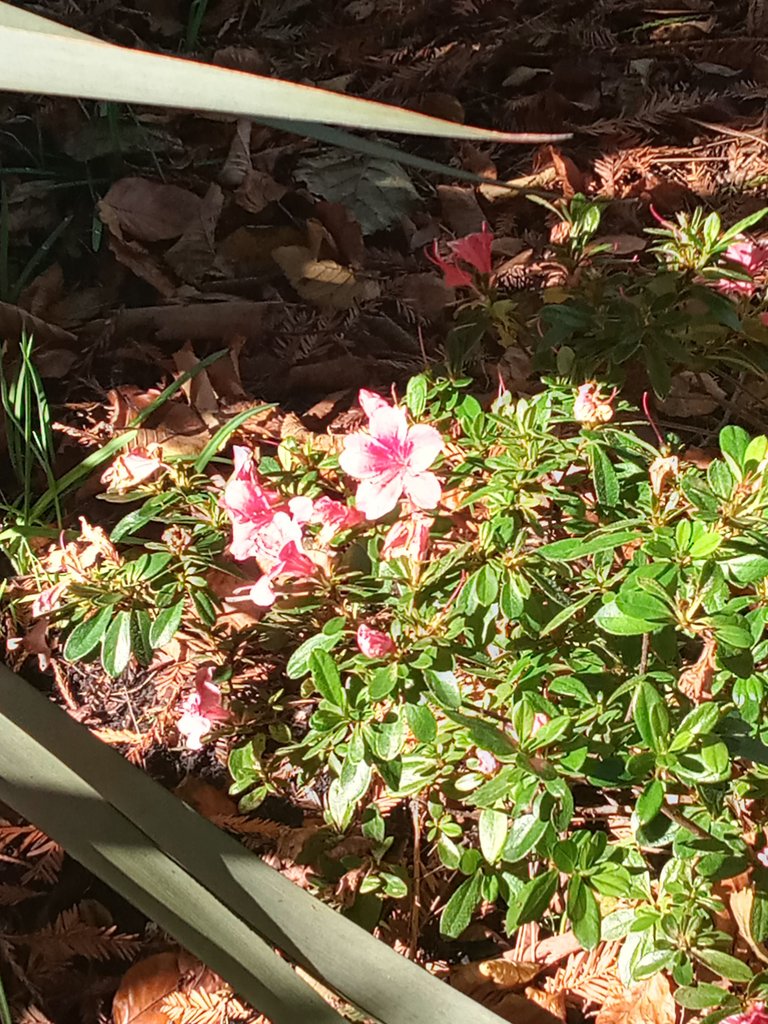
"For the third time I am trying to get to this point," he said as he handed me another ethereal handkerchief, "and I will roll Stolz and Herr Frick right on into it: no, youth never returns, and happy circumstances cannot always remain, but for you, and those called as you are, you need not look back with 'what if' and if only.' Seek the light, for it is ever before you, you called to even describe even darkness in terms of how it best shows forth light."
He smiled.
"Did you know in that dark midnight that in the morning, three of your companions from 2022 would have grown so much as to have overtaken you on the climb, and now, you four are now climbing together to meet 2025? All those dark days and nights ... all those hours of walking by the light of faith, hope, and love, with no assurance that your dearest hopes would ever be realized ... walking in the light of the One Who called you, learning to be content, learning this was enough, learning to thrive in solitude and live with grief -- only to be overtaken this morning! Now that was a corner you could not see around!"
I will not say I blacked out -- I had gone for a walk to try to process it, and was simply overtaken by the blaze of light and joy.
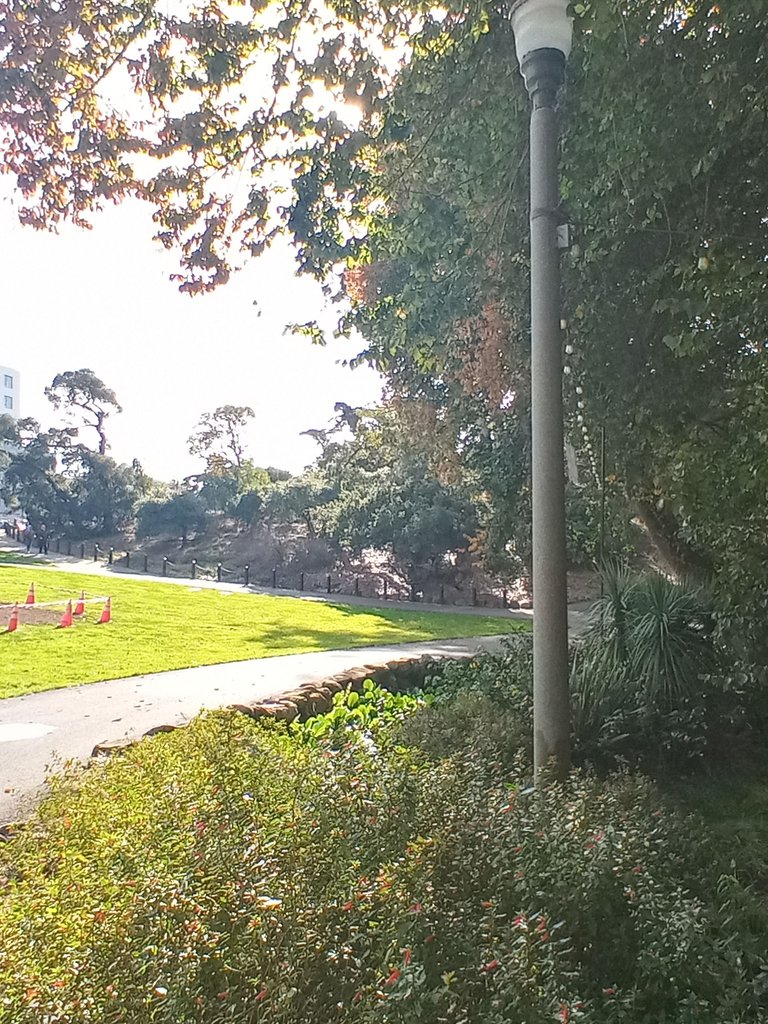
It was a strange thing, however ... I had not been able to process that in the few hours since because I had been let down so many times ... could I afford to even have this joy with all the things the past suggested could and would go wrong?
But that was the lesson: without regard to the past that was done and the future no one knew, I could have all the things that came to me. I had felt the sorrow in full ... and could feel the joy in full ... the world would continue to turn, and I could walk by faith, hope, and love through it all, and keep doing something about the things I could do things about to make things better for me and those I could reach ... and be with those of like mind in doing it.
No one may prevent the storm, and winter itself, from coming, but if one hears the call of wisdom and love, one may find refuge from whence it comes, and be safe there ... and if not alone, then safe among others who accept the responsibility of being stewards of that safety.
Seeing that I was wobbling, my companion put his arms around me to steady me.
"That was a sharp emotional change you have had in less than 12 hours," he said, "and you came right out to push your physical limits -- but not too much, especially before breakfast. You are growing in wisdom, Frau Mathews ... but tell me this: you noted the luxury of having time for deep grief, but did you utilize it in full?"
"I would not have been able to get myself back together and show up on time at the dawn meeting if I did that," I said.
He made his voice very gentle.
"And that is why, Frau Mathews, we also still have work to do in this area. You think a great deal about the needs and feelings of others, and that speaks well of you in these selfish times. I assure you that you also have enough room in that vast intellect to continue to find more ways to attend to your own needs and feelings within your calling. It is good that you attend to your time in nature; that is essential."
He sighed, and then smiled gently.
"I suppose a particular little old German bass had better recognize he cannot yet be blessedly silent in his permanent retirement -- he seeks to decrease so others can increase, but someone around here has him designated as essential and will not change the designation!"
"Absolut nicht!" I said, and he laughed.
"Sie gewinnen, Frau Mathews -- you win."
He smiled gently.
"Once upon a time, when you were a wee one reading of the Creation, I sang about the evening and the morning of the third day, when the sea and the dry land were divided."
So, he walked out onto the pier at Alvord Lake and reprised the performance in which he had sung my heart out of my chest and carried it right off with him, quite by accident while singing himself clear from stormy darkness to light, and upon getting there, getting into such joy as at last goes beyond mere merriment ... as if to even see such a morning brought joy to the height of awe and humility and reverence ... that ending of "Rollend in schäumenden Wellen" presents the singer thus completely overjoyed, his eyes and face shining and huge voice soft in awe and love. From storm and stress right up to a glimpse of Paradise not yet lost -- in less than five minutes!
As I listened, I realized ... of course, he had a immense and immensely beautiful voice, and was a masterful interpreter, but in that he was not ashamed to be his full human self while still always keeping it together, he made room for me, emotionally, to be able to still keep it together, but also be able to get through the actual range of my feelings. His singing carried me, literally, across gaps I could not express and keep balance.
By extension, just as it was with the Negro Spiritual, life-affirming music, although life was not always pleasant, made room. "Ich wandte mich" and its two early companions in Brahms's Four Serious Songs are a mournful acknowledgment of sad realities of human life, some so sad that death itself is sometimes a needed relief because there are fates worse than cessation of mortal life. Little wonder the thought can make us troubled in mind, as Samuel Coleridge-Taylor's glorious piano piece shows us!
However, there are not just three serious songs, but four, just as "Rollend in schäumenden Wellen" does not end in D minor -- such music, just like the Negro Spiritual, provides light, pointing upward through hope and faith to love ... from evening, to morning. Samuel Coleridge Taylor's "I'm Troubled in Mind" is likewise shot through with moments of brilliant light. Thus I understood my own work as singer and composer as well, and from there I also was making baby steps again.
I must have fallen asleep, for I came to myself to find the ethereal singer also relaxing in our improvised "private box seats" ...
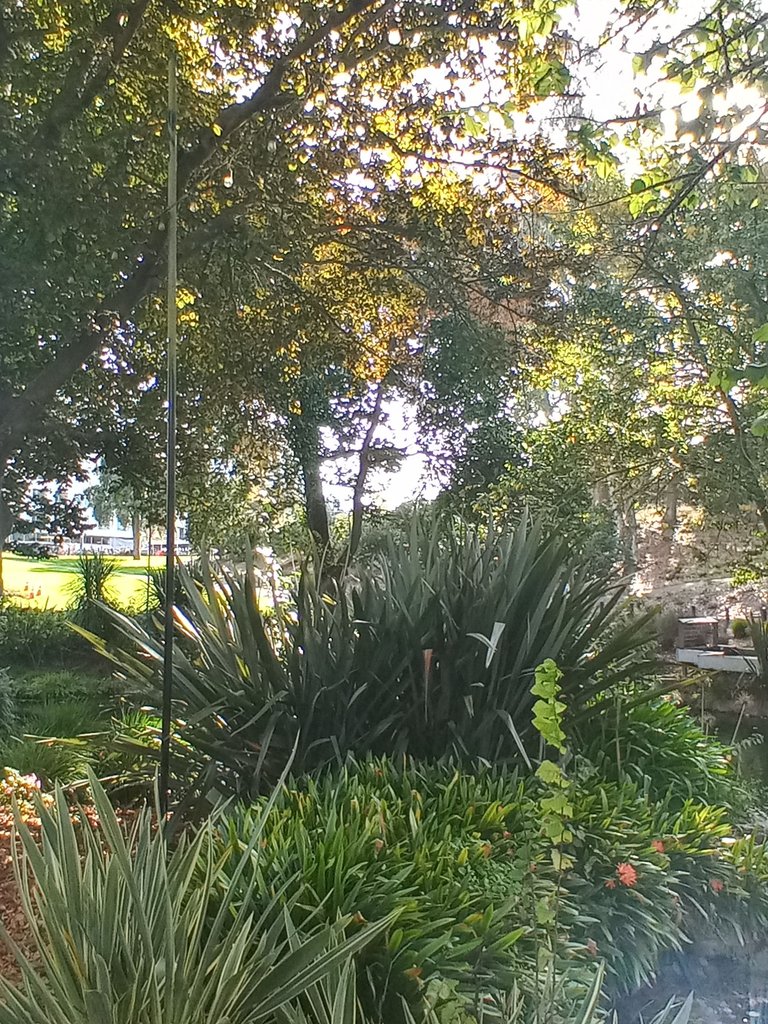
... the crowd having come and gone, and him half-in-dream, vocalizing the bass line of the D major section of "Rollend in schäumenden Wellen" from D2 down to A1 and then D1 and back up again, quite possibly doable in his mortal warmup range, easily reached in his immortal voice. So, since I can vocalize down to a D3, I made a contralto reprise of the melody, folding the lines upward where I could not reach the lowest notes, and smiled as he heard the "echo" of his own voice and opened eyes wide with surprise and delight! He kept up the bass line until I came to the very end and improvised a walk from A3 down to D3 as he sang the original line from A2 up to D3 and met me there, a sweet harmony becoming a unison.
"Thank you for the morning waltz -- a little contralto improv for you to enjoy," I said.
"Vielen Dank, Frau Mathews," he purred. "I did enjoy that immensely."
He then started slightly as another thought occurred to him ...
*"Gott ... Sie Dank ... Vielen Dank ... Das ist die Antwort auf mein Gebet ... ich sehe ... ich verstehe!"
He was suddenly overjoyed, his eyes and his face and his smile beaming -- and then looked at me and dazzled me!
"My prayer for understanding has been answered regarding you, Frau Mathews," he said. "We shall have quite the Thanksgiving next week, and grateful rest shall make a lovely pivot point ... I yet have to plan my lessons ... but I see ... I see. You yourself handed me the key ... or rather, sang it to me, just now."
"Contralto remakes of bass parts in Haydn?" I said.
He laughed uproariously, a laugh that ended in an immense, gentle smile.
"Frau Mathews, you are consistent in doing one thing for everything, and persistent even when you understand almost as little as everyone else about why. I leave you that riddle until next week, however, and say only this: enjoy the brightness of this morning to which you have come, and watch the light rise over everything that concerns you."
